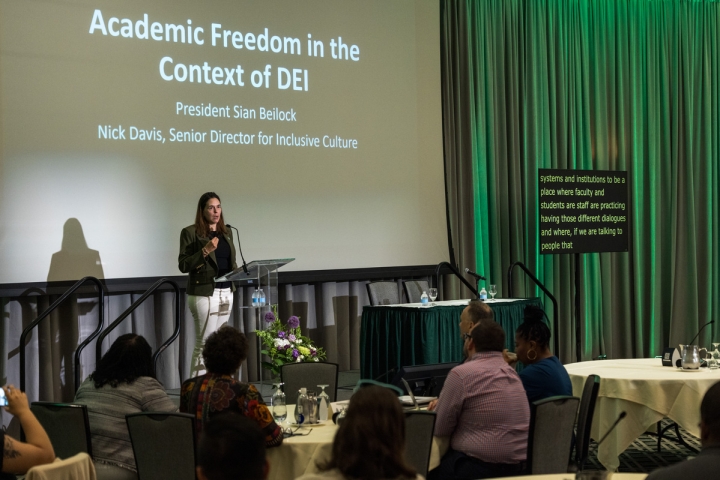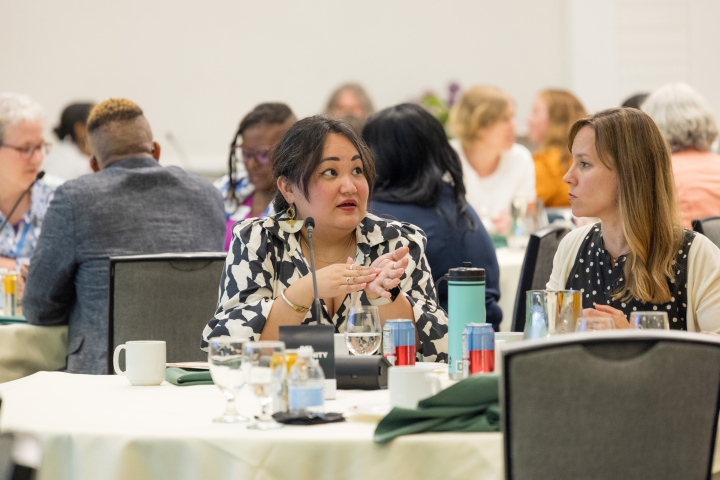Speakers at a community forum on Tuesday said institutions of higher education must continue to be strategic and to support diversity efforts as states make drastic changes to diversity, equity, and inclusion.
The hybrid event, which was hosted by Institutional Diversity and Equity and drew more than 100 people, was held just ahead of the Supreme Court’s imminent ruling on the legality of using race as a factor in college admissions. It featured small group discussions of topics related to diversity, equity, and inclusion, as well as several speakers, including Paulette Granberry Russell, president of the National Association of Diversity Officers in Higher Education, who gave the opening address.
Granberry Russell highlighted recent legislation in several states aiming to dismantle diversity, equity, and inclusion work in higher education. She also stated it is important to understand the history of previous rulings such as Bakke v. California in 1978 and Grutter v. Bollinger in 2003.
Granberry Russell urged the audience to read such legislation carefully and also stressed the importance of making a clear case for diversity, equity, and inclusion efforts in higher education.
“We talk about academic excellence,” she said. “How do you achieve excellence in the absence of diversity, whether that’s diversity of thought, diversity of experiences, diverse histories, diverse thinking about the future?”

Among the speakers was Dartmouth President Sian Leah Beilock, who highlighted how work on diversity, equity, and inclusion relates to academic freedom and freedom of expression, which she said is “so at the heart of our educational mission.”
“True freedom of expression, where you’re actually pushing at people to rethink their ideas,” to challenge assumptions and to make mistakes, requires building a diverse community where people feel like their voices can be heard, President Beilock said.
Working with individuals, and changing systems, can ensure “that we can have different voices, different lived experiences at the table, so that we cannot just have safe spaces, but what I like to talk about as ‘brave spaces,’ where different viewpoints and experiences come together, where people feel like they can have discourse and dialogue,” she said.
The online and in-person audience spent a good portion of the afternoon grappling with questions posed by the speakers.
Nick Davis, senior director of inclusive culture in Institutional Diversity and Equity, first defined terms that are often used interchangeably—freedom of expression, free speech, academic freedom—and gave a primer on the First Amendment.
“An ability to express one’s opinions, ideas, thoughts, and beliefs freely without suppression, obstruction, and penalties is traditionally protected as a constitutional right,” he said.
He described some of the standards universities have used to evaluate their response in various scenarios.
“We have seen campuses come in and ask, ‘is this an imminent threat? Is this an incitement of violence?’”
And then he asked the audience to consider how institutions can strike a balance between inviting speakers with diverse perspectives, respecting freedom of expression, and ensuring a safe and inclusive environment for all members of the community.

Dean Lacy, who will become vice provost for faculty affairs on July 1 and is also a professor of government and director of Dartmouth’s program in politics and law, also posed questions for the audience to mull over and described the many factors that are weighed in the admissions process, of which race is only one.
Senior Vice President and Senior Diversity Officer Shontay Delalue said more opportunities for similar discussions would be forthcoming. And, noting a comment from a participant that the national attacks on DEI work are “daunting” and “exhausting,” she wrapped up the event on a high note, celebrating progress that’s been made since 2021, when she and Chloe Poston, vice president for culture, belonging, and strategic engagement, arrived at Dartmouth.
“While using evidence-based data to center diversity, equity and inclusion work as well as showing how DEI is intricately connected to academic excellence, it is important to reflect on progress,” Delalue said.
“We’ve been told in the last two years that we’ve done more in diversity, equity, and inclusion here at Dartmouth than people have seen in a decade,” she said. “It doesn’t mean that we’re solely responsible for eradicating years of oppressive systems…It does mean that we’re committed to the community. We’re committed to making spaces (for inclusive dialogue) to happen, and also ensuring that we uphold our institutional values.”


